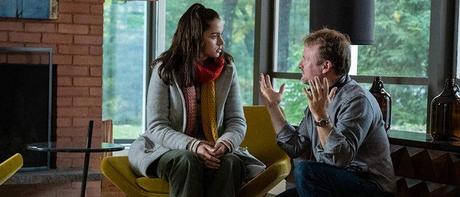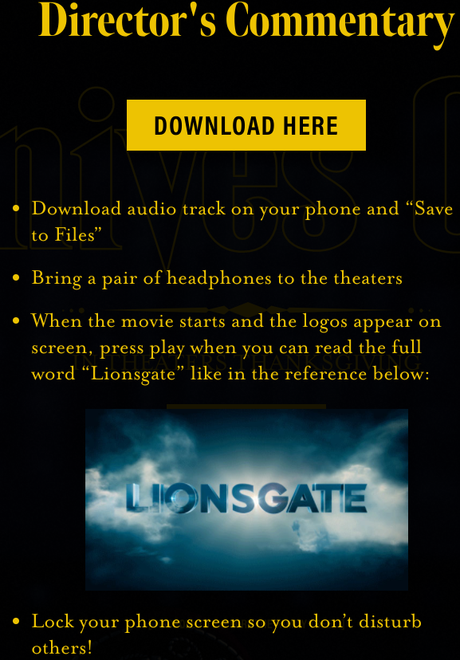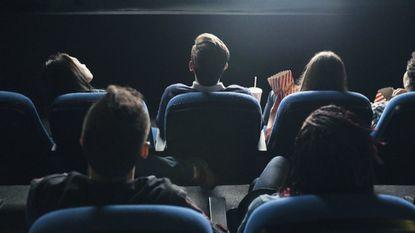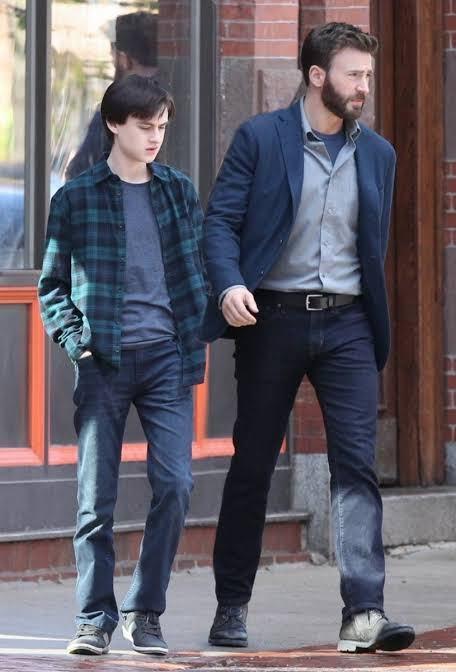
My stepfather once watched an entire movie without realizing he'd accidentally switched the audio on the DVD to the Director's Commentary track. "What'd you think of the movie?" I remember asking him afterward. "Pretty good, I guess," he said with a furrowed brow. "Interesting story, some fun action scenes, but I don't know why they had that guy talking over everything and explaining how they made the movie. Kind of hard to concentrate with him yammering on."
This was back in the early days of DVD, a time when the world was first adjusting to the existence of something called a "Director's Commentary." Stories like the one I just shared were not entirely uncommon back then, although I'm still stunned my stepdad actually sat through the whole thing and never realized something wasn't right. We've come a long way since then. For one thing, an entire generation below us has grown up without ever seven seeing a DVD. For another, we don't even need discs to listen to commentaries anymore. There's an app for that!
OK, not an actual app, at least I don't think so. However, we can use our phones to listen to commentaries while certain movies are still playing in theaters. Just download the audio file to the phone, head to the nearest theater, bring some earphones with you, and hit play on the phone as soon as the movie starts. Bada bing, bada boom, you're good to go. Not many directors take advantage of this, though. It's largely just a Rian Johnson thing:
Listen to something on your phone while watching a movie in a theater? As Benoit Blanc might say:

Well, maybe not "foul play," per-say, but definitely, something that feels like it's walks right up the line of violating the moviegoer code. How do you listen to your phone in the movie theater without annoying the people around you? I tried it out. It's fairly easy to pull off, really.
 Johnson admits Marta's "telling a lie makes me physically ill" affliction is, no real surprise, completely made-up, just a screenwriting shortcut he used to play with tension.
Johnson admits Marta's "telling a lie makes me physically ill" affliction is, no real surprise, completely made-up, just a screenwriting shortcut he used to play with tension. Whenever we go to a movie, there are certain rules we're all supposed to honor. Mostly, don't talk during the movie and leave your damn phone in your pocket. If you have to take a call, step outside first. Some theaters, like Alamo Drafthouse, run funny, but rather threatening videos right before the trailers to remind the audience of the rules. Others, like AMC and Regal, resort to polite reminders baked into standard "you still have time to go buy popcorn" videos. Either way, if you're simply paying attention to what's on the screen it's fairly easy to get the message - they really, really want you to stay off your phone!
To get that message, however, you have to be looking at the movie screen and not your phone. Easier said than done for some, especially when you consider the most recent phone addiction statistics indicate 66% of the population shows signs of nomophobia (the fear of being without their phone) and the average smartphone user taps or swipes their screen 2,617 times a day. It's a problem, and this addiction often manifests itself when people go to movies. I've lost track of the number of times I've been in a theater where quite suddenly a little phone screen lit up as someone decided to check their text messages or scroll through Facebook. (Emergency text messages, I get, but Facebook? Time and place, man.)
I never want to be that person. As such, when I read about Rian Johnson's in-theater commentary I was intrigued but a little fearful that I'd try it and have something go horribly wrong with my phone leading to a moment where suddenly the entire theater would hear the commentary or at least notice the light from my screen. When you go to download the commentary track, though, there are easy-to-follow instructions for how to pull this off without bothering anyone around you in the theater:

Sure enough, it really is that simple. If you time it right, the only time anyone around you might even notice your phone is right when the Lionsgate logo rolls and you hit play on your phone to sync the commentary with the movie. Otherwise, no one will likely notice what you're doing. That was my experience with it, at least, particularly since I used a Bluetooth earphone, meaning no cable.
I was there with my phone and Bluetooth at a sold-out late-night showing and no one noticed what I was doing. However, it took me quite a while to truly believe that since sitting in a movie theater and listening to Rian Johnson "squawk in your ear" while Knives Out plays up on the screen and everyone around you sits in polite silence is a tad surreal. It's a bit like having a private conversation in the middle of a crowded room but nobody else is talking.

I repeatedly used the volume controls on my earphone to lower the volume out of a paranoid fear that surely someone around me could hear the faint echoes of the track and would eventually trace it back to me. I felt an innate need to "shhhhhh!" Johnson a couple of times because, hey, the dude is talking during the movie. Cut it out! That's what happens when a lifetime of moviegoing behavior is disrupted by something new.
Of course, I've enjoyed countless director commentaries from the comfort of my own home, and Johnson is quite good at them, striking a conversational tone and offering up a fun mixture of behind the scenes trivia, surprising insight, and self-deprecating wit. With Knives Out, once I moved past the awkwardness of transporting this experience to the actual movie theater I simply gave in to Johnson's stories and explanations. For example, Toni Collette picked the 80s pop song her Influencer character dances to while Jamie Lee Curtis ignores her at the party, but it wasn't until much later they realized how much it was actually going cost to get the rights to use the song in the movie. (Thankfully, they had enough money left in the budget to handle it.)
I shared my favorite tidbit from the commentary on Twitter:
Rian Johnson #KnivesOut in-theater commentary tidbit:
- Kelly Konda (@WeMinoredInFilm) January 23, 2020
After wrapping production, he asked if he could keep the wheel-of-knives prop, but they said it actually had to be disasembled in order to return the knives to a prop rental agency. That means this doesn't exist anymore. pic.twitter.com/DM0Zp0QZZA
So, I spent the first half of the film paranoid that somehow everyone around me could hear the commentary, and then I spent the second half so focused on the screen and Rian's voice in my ear I forgot there was anyone else in the theater. If you have the time/money/the flexibility of an AMC A-List subscription, it's highly recommended. Just, you know, make sure you've already seen Knives Out once before you do this. As my stepdad found out so long ago, listening to a director's commentary for a movie you've never actually seen before is not exactly the ideal viewing experience.
Then again, it used to be far easier to make that kind of mistake. To do what Rian Johnson suggests for Knives Out requires commitment and time. You probably already know if you're the type of person up for that kind of thing. If you are, fret not - it's easy to pull off, and Johnson's commentary adds a lot to the film. Plus, just like us, sometimes he loves it so much he goes silent and then admits he just loves watching the performances or listening to Daniel Craig's southern accent, which the actor based on a rather avuncular historian who gets a lot of face time during Ken Burns' Civil War.
That's it, I swear, the last little tidbit I'll share from the commentary.
Also, while Chris Evans and Jaeden Martell were filming Knives Out Evans had already lined up an Apple limited series called Defending Jacob and Martell was auditioning to play his 14-year-old son who has been accused of murder. They tried not to talk about this other project, to keep their focus on Knives Out, but it was kind of impossible to avoid.
 Luckily, Martell got the part.
Luckily, Martell got the part. Ok. That's it. To get the rest, you'll have to listen to the commentary.
You can download the in-theater commentary here and risk the mild social discomfort I experienced.

